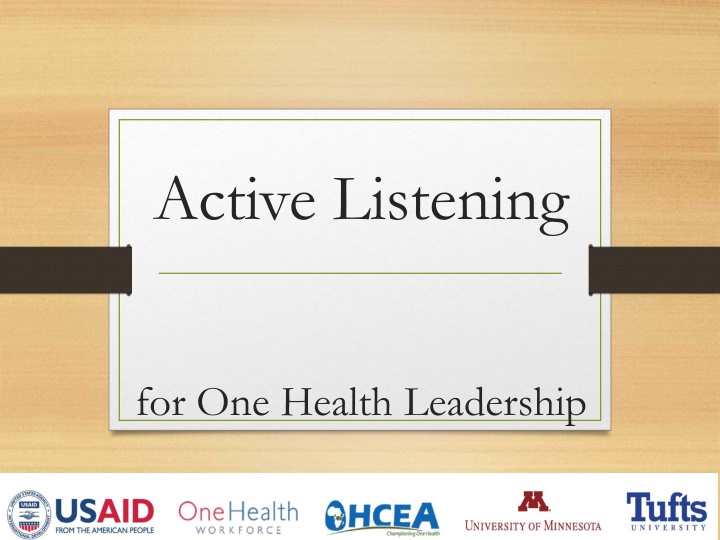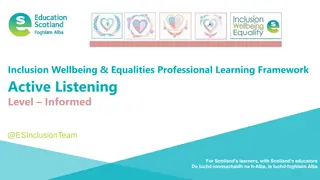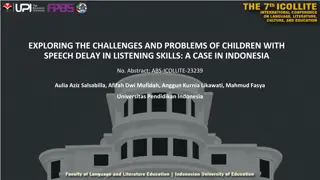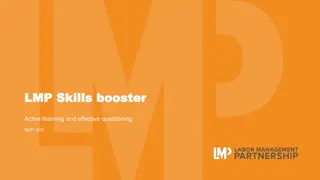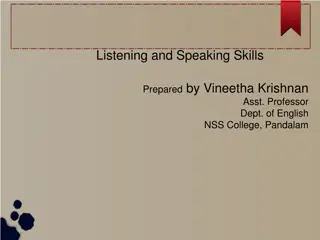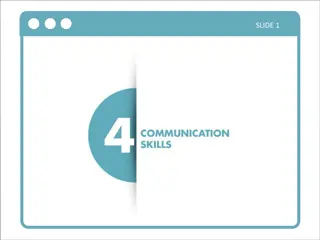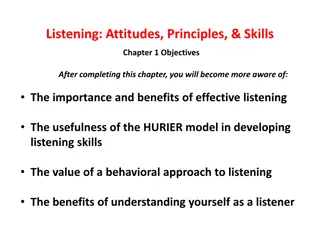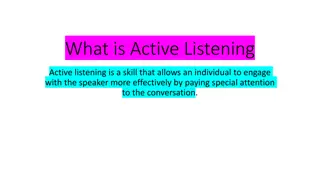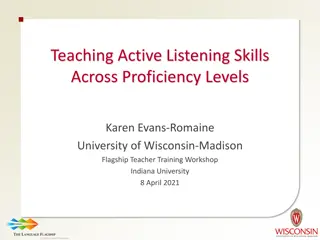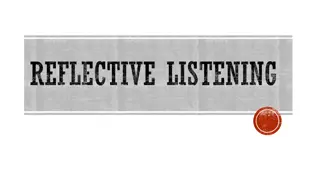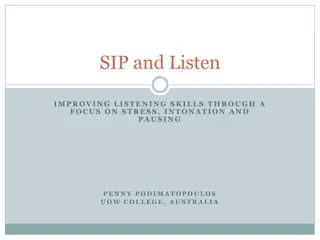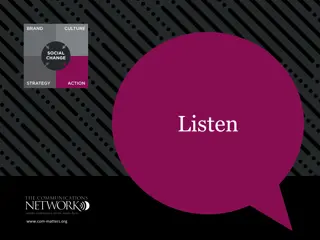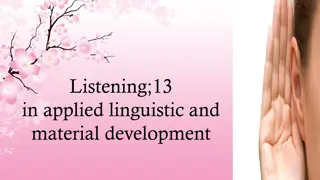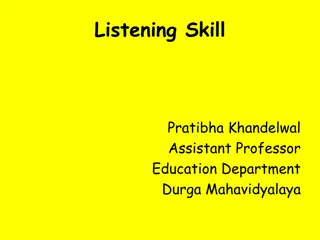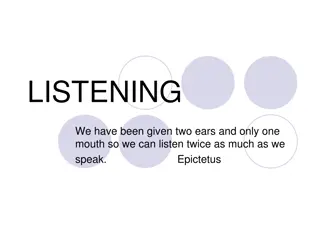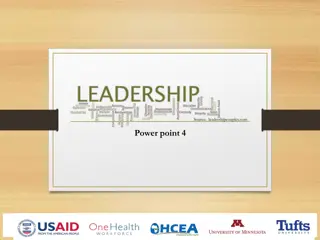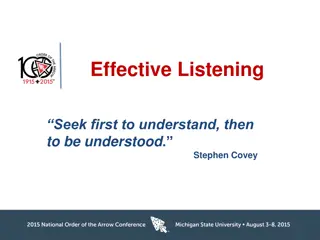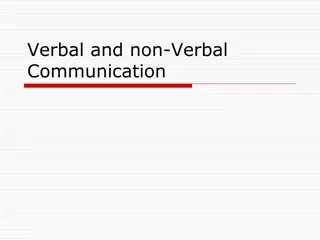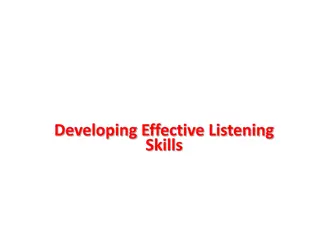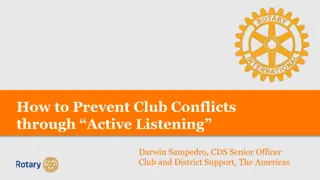Enhancing One Health Leadership Through Active Listening
Explore the importance of active listening in One Health leadership, focusing on techniques such as reflecting, paraphrasing, and repeating. Discover the differences between dialogue and debate, and learn about the listening spectrum. Engage in exercises to deepen listening skills and communication within a group setting.
Download Presentation

Please find below an Image/Link to download the presentation.
The content on the website is provided AS IS for your information and personal use only. It may not be sold, licensed, or shared on other websites without obtaining consent from the author.If you encounter any issues during the download, it is possible that the publisher has removed the file from their server.
You are allowed to download the files provided on this website for personal or commercial use, subject to the condition that they are used lawfully. All files are the property of their respective owners.
The content on the website is provided AS IS for your information and personal use only. It may not be sold, licensed, or shared on other websites without obtaining consent from the author.
E N D
Presentation Transcript
Active Listening for One Health Leadership
Objective Increased understanding of and improved skills in active listening.
Session Outline Dialogue vs. Debate The listening spectrum Active listening techniques Exercise: Listening deeply Keys to becoming a skilled listener
Dialogue Vs Debate? Dialogue Debate Many people have part of the answer. There is a right answer and you have it. Explores common ground About winning. Listen to understand, create shared meaning, fresh thinking, find agreement. Listen to find flaws and counter arguments. Reveals assumptions for evaluation. Defend our own assumptions. Discover new options, not seeking closure. Seek a conclusion that ratifies your position. Combative: participants try to prove the other side wrong. Collaborative: participants work together toward common understanding.
The Listening Spectrum Here is what I would do Listen to words and emotion Listening focussed on others Just hear words Me too Intuitive Listening Listener Focussed on Self Active Listening
Active Listening Techniques Reflecting describing the message using your own words and sentence structure Paraphrasing describing the message using similar words Repeating Repeating the same message using exactly the same words as the speaker Meaning (Shared understanding) Feeling (how) Words (what)
Exercise: Listening Deeply 1. Break into threes. Each member of the trio will have a role Speaker , listener, observer (who watches without speaking) Facilitator provides a question to be answered. Speaker responds to question. (3 mins) 2. 3. 4. Debrief: 1. 2. 3. Speakershares how they felt about the exercise (1 minute) Listener shares how they felt about the exercise (1 minute) Observer points out what they observed about the process (1 minute) 5. Repeat the exercise after rotating roles.
How you felt as a speaker? Confident about ability to facilitate, communicate messages Challenged to understand how institutions will participate (in- service training) Felt artificial (not a real-life scenario) Happy to be listened /attended to (respected) Connected to listener (attentiveness, paraphrasing, appreciated) Confident in delivery of training Intimidated (by listener +/- observer) 9
How you felt as a listener? Attentive, challenged, seeking to understand, interested Challenged Took effort to pay attention, appreciated (by speaker), recognized areas for continuous improvement (e.g. but ). Amazed at confidence of speaker. Difficult to follow speaker (too fast and facing away from listener). Not well informed / briefed on subject matter. 10
Observer: What did you see? Good non-verbal communication, no disruption, paraphrasing Building rapport between speaker and listener Good communication and follow-up questions Artificial (created observation of good practices and no critical behavior) Good non-verbal and verbal communication Natural feeling, need for speaker to be knowledgeable about subject matter 11
Keys to becoming a skilled listener Make intentional choice to listen LISTEN WITH ATTENTION Invest in other person s point of view WALK IN THEIR SHOES Look, act, and be interested PAY ATTENTION Do not interrupt, block, or stop communication RESPECT SPEAKER Listen to words and the music (emotion) LISTEN WITH YOUR HEAD AND YOUR HEART
Keys to Becoming a Skilled Listener Ask only clarifying questions BE SURE YOU TRULY UNDERSTAND Try not to judge or evaluate SUSPEND JUDGMENT Pay attention to your own behavior BE SELF AWARE If anger or strong emotions surface - add light, not heat to the process BE CALM Allow silences and pauses. BE PATIENT THE MORE YOU LISTEN, THE MORE YOU CREATE A THINKING ENVIRONMENT FOR EVERYONE!
Listen L = Look interested - get interested I = Involve yourself by responding S = Stay on target T = Test your understanding E = Evaluate the message N = Neutralize your feelings 9/17/2024 14
